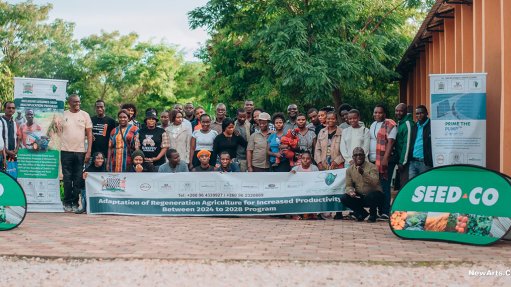
International agricultural programme designed to empower Zambia’s rural population.
Agribusiness company Schweizer Agriculture and seed company Seedco Zambia International have launched a nationwide horticulture training programme under the Schweizer Agriculture' Poverty Alleviation and Rural Development (PARD) consortium.
The implementation of the training programme involves 60% capacity building inputs from the Zambian government, with the private sector contributing the balance.
The programme is aimed at increasing productivity in key Zambian resettlement schemes operated by the Department of Resettlement under the Vice President's office.
The current business value of horticultural products totals about $20-million – vegetable seeds only – but with fruit trees this can reach above $25-million.
Zambia has a growing population of about 20-million, of which about two-million are farmers. About 80% of the country's rural economy is solely dependent on agriculture and its supporting industries.
Nonetheless, a tight climatic changing period characterised by prolonged dry spells and flash floods, coupled with global grain distribution challenges affecting the world, makes it challenging to feed the population. This therefore, compounds on the crop yields, in some cases.
To this end, the Schweizer Agriculture and Seedco Group International programme has been designed to provide livelihoods, food security and national development for those residing in rural areas.
The training objective is tailored to enhance knowledge, horticultural insights and access to agricultural mechanisation, finance and market linkages, as well as to holistically build the capacity of small-scale farmers.
Meeting Criteria
The Schweizer Agriculture and Seedco International partnership aligns with the five pillars of the Zambia National Agricultural Policy 2012-2030, which is a cross cutting policy with the vision to develop a competitive and diversified agricultural sector driven by equitable and sustainable agricultural development.
The policy pillars include promoting a sustainable increase in agricultural productivity of major crops with comparative advantage; continuously improving agricultural input and product markets to reduce marketing costs and increase profitability and competitiveness of agribusiness; increasing agricultural exports as a way of fully using the preferential markets – regional and international – and increase contribution to foreign exchange earnings; and improving access to productive resources and services for small-scale farmers, especially women and young farmers.
The pillars also involve the continuous strengthening of public and private sector institutional capabilities to improve agricultural policy implementation, resource mobilisation, agriculture research, technology dissemination and implementation of regulatory services.
The two organisations' training programme thus falls squarely within the ambit of the Zambia National Agricultural Policy 2012-2030.
For instance, SeedCo Group International is a Pan African Seed Company business that develops, breeds and supplies certified seed species with a focus on hybrid maize, wheat, soyabeans and vegetables through robust research and development.
Seedco also specialises in breeding tomatoes, peppers, gherkins, cucumbers, zucchini, eggplants and watermelons – for both open field and protected culture – for specific segments in sub-Saharan African countries, such as South Africa, Zambia, Zimbabwe, Botswana, Namibia, Mozambique and Malawi, as well as in the Middle East.
Such a focus is partly what the policy seeks to achieve with the involvement of private sector players, such as Seedco International and Schweizer Agriculture.
"The current proposed Schweizer Agriculture PARD commercial assortment comprises more than ten varieties, and new ones will be continually added," said project lead executive director Joas Mukanda Chihangu.
Schweizer, in collaboration with Seedco International, will work with specialised growers in the identified and proposed key resettlement schemes.
Through this approach, the consortium is able to introduce new varieties with key characteristics, such as yield, resistances and suitability to local climates to suit the customers’ needs and wishes.
The PARD programme is looking at developing 600 ha of horticultural cultivation activity under the theme ‘Poverty-Alleviation and Rural Development through Regenerative Agriculture for Increased Productivity between 2024 to 2028’.
The work will involve the developing of chilis, tomatoes, cabbages, red onions and spread to other crops for supply to markets in the Democratic Republic of Congo, Malawi, Mozambique, Saudi Arabia, United Arab Emirates, Qatar, Dubai and Italy.
Schweizer and Seedco will drive the distribution of vegetable seeds for green maize, tomatoes, chillies, cabbage, rapeseed and red onions – with the exception of fertilisers, chemicals, legumes and maize seeds – which will be coordinated by the consortium.
"Together we encourage the adaptation of developed breeds or hybrid programmes for the entire range of horticultural crops in cooperation. Seedco Zambia, of Seedco International, is actively involved in promoting and distribution programme of new tomato and chilies set varieties which are marketed under the trade name ‘Quality Pard’,” the two organisations said.